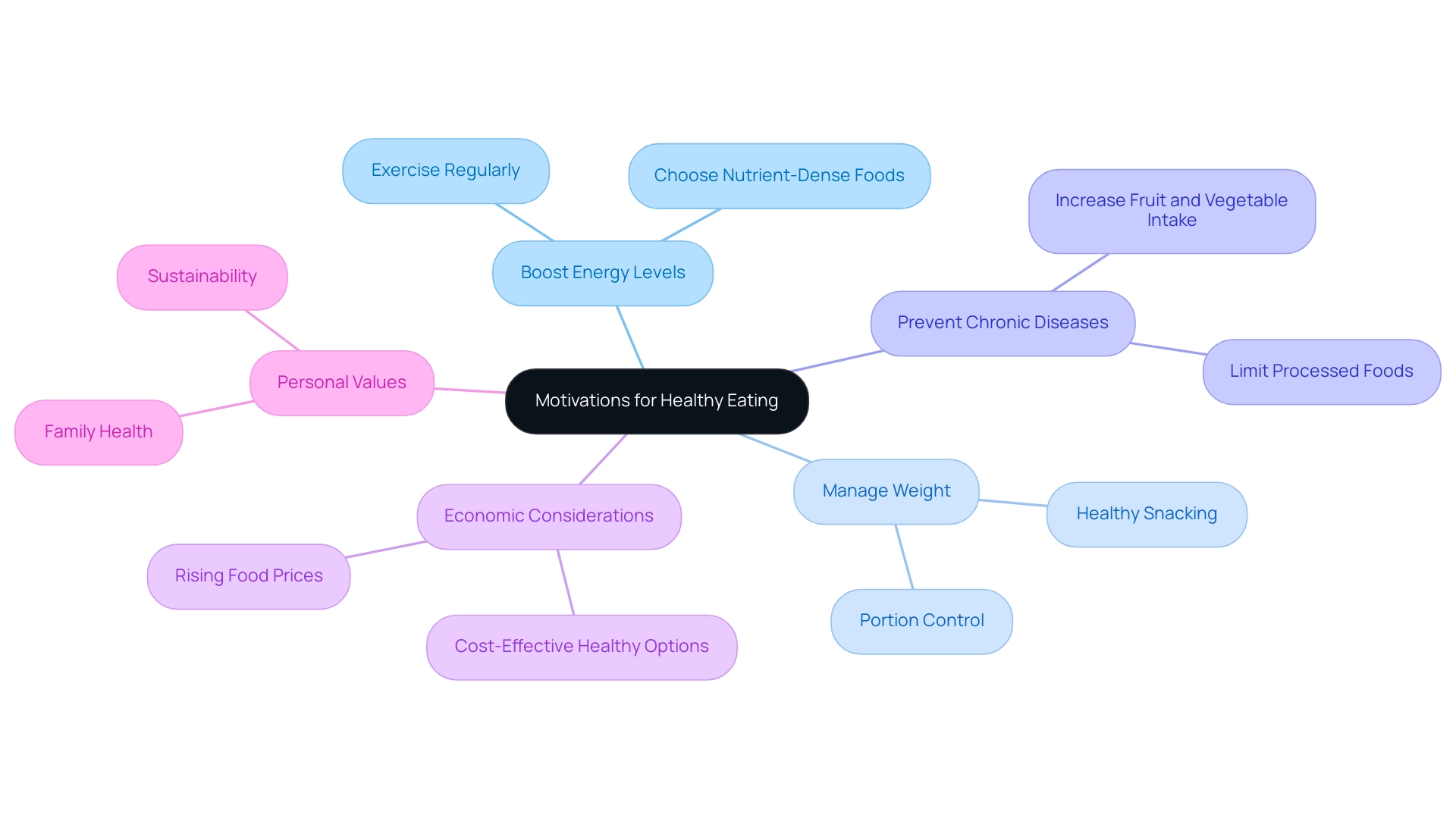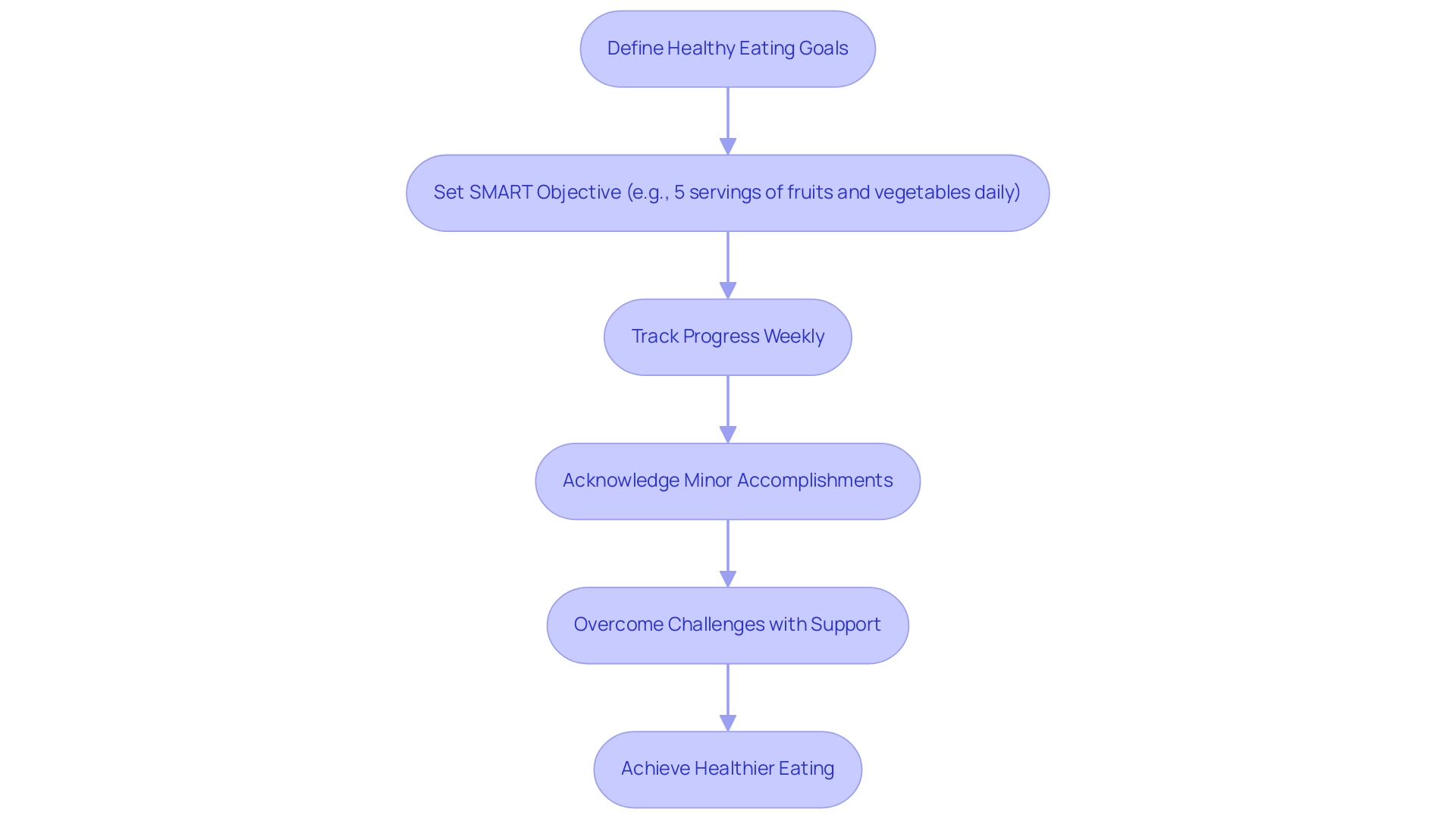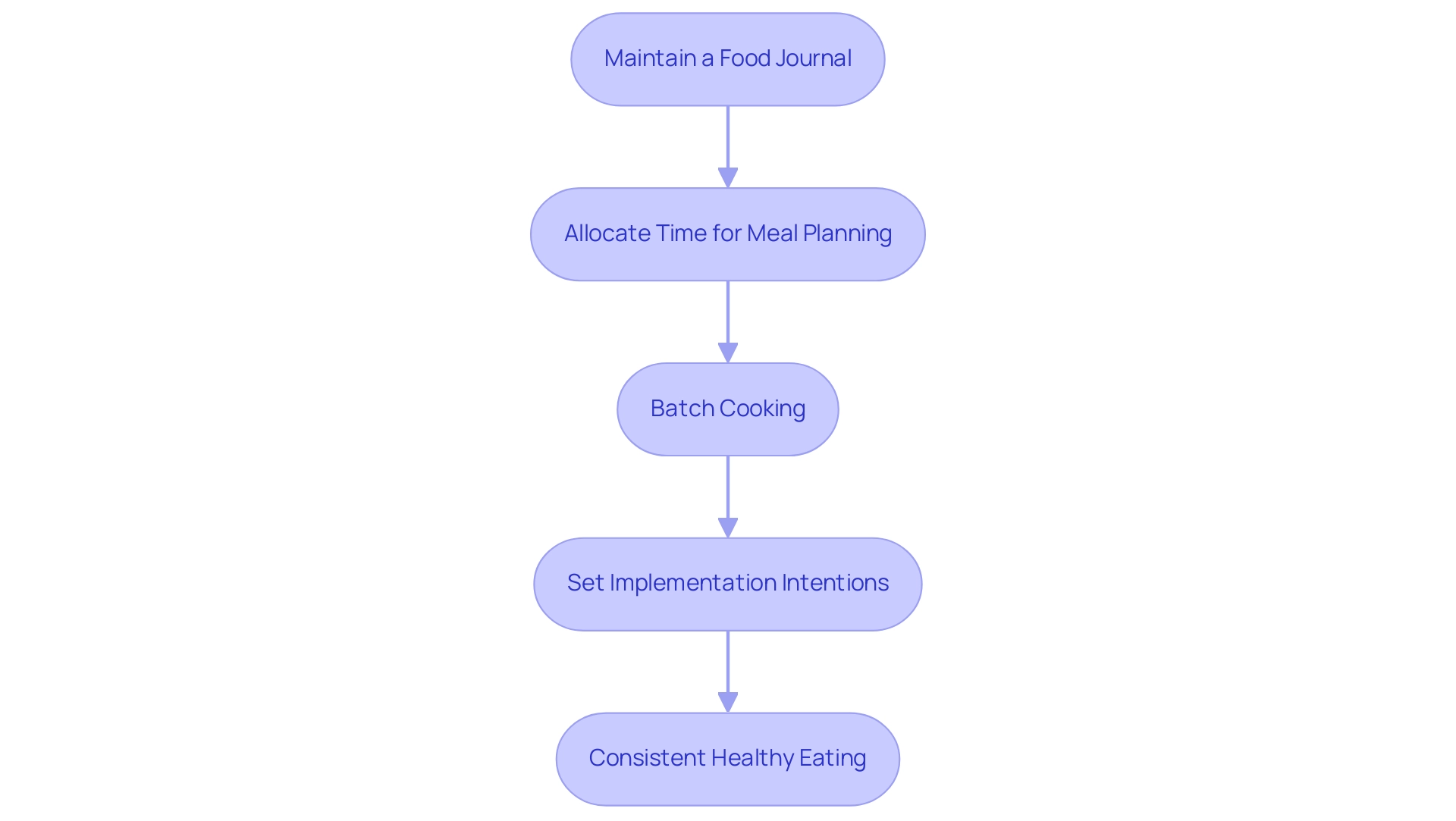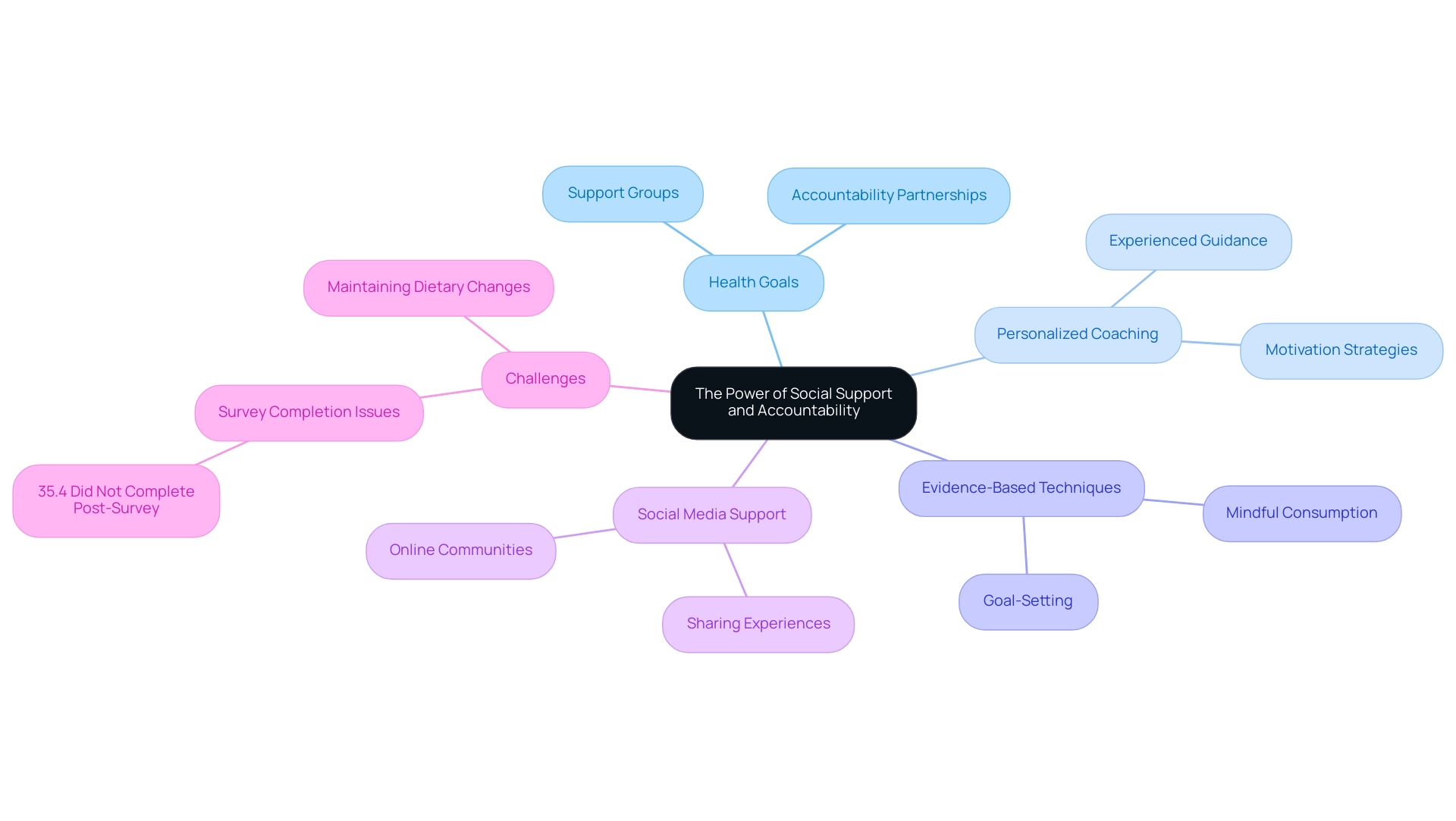Overview
To stay motivated to eat healthy, individuals should reflect on their personal motivations, set clear and achievable health goals, and utilize practical strategies such as meal planning and social support. The article emphasizes that aligning eating habits with personal values and maintaining accountability through coaching and community can significantly enhance commitment to healthier dietary choices.
Introduction
In a world increasingly focused on health and wellness, the journey toward healthier eating habits can often feel overwhelming. With a myriad of motivations driving individuals—from energy boosts to weight management and disease prevention—understanding the deeper reasons behind these choices is crucial.
This article delves into practical strategies for fostering a commitment to healthy eating, highlighting the importance of:
- Goal-setting
- Social support
- Self-reflection
By exploring evidence-based techniques and personal experiences, readers will discover how to navigate their unique paths to better nutrition, ultimately transforming their lifestyles and enhancing their well-being.
Understanding Your Motivation for Healthy Eating
It is essential to reflect on how to stay motivated to eat healthy and the reasons that drive your desire for healthy eating. Are you aiming to boost your energy levels, manage your weight, or prevent chronic diseases? Taking the time to express these reasons and writing them down can serve as a powerful daily reminder of how to stay motivated to eat healthy and maintain your commitment to a healthier lifestyle.
Our personalized coaching provides tailored support and expert guidance to help you navigate these motivations effectively. Recent studies suggest that many individuals are increasingly checking ingredient and nutrition labels—43% in the latest survey, a significant increase from 36%—highlighting a growing awareness of food choices. Furthermore, with a 19% increase in food prices in Poland compared to the previous year, economic factors are influencing many to consider healthier options.
Considering how your eating habits align with your personal values, such as sustainability or the health of your family, can deepen your commitment to these ideals. This self-awareness not only strengthens your motivations but also provides insight on how to stay motivated to eat healthy by aligning your food choices with your values, ultimately enhancing your commitment to a healthier way of living. With the support of experienced coaches using evidence-based techniques, such as motivational interviewing and goal-setting strategies, you can make lasting lifestyle changes that empower your well-being.
As one of our clients shared, 'The coaching helped me realize the importance of my choices, and I feel more motivated than ever to stick to my goals.' Moreover, a case study on the effects of unhealthy consumption and inactive lifestyles shows that poor food selections are contributing to increasing obesity rates in the U.S., with nearly half of U.S. adults expected to be obese by 2030. Understanding these consequences can provide insights on how to stay motivated to eat healthy and adopt healthier dietary habits.

Setting Clear and Achievable Health Goals
Defining what healthy eating means to you is the first step toward successful dietary change. At Foresight Health Coaching, we embrace the SMART objectives framework—Specific, Measurable, Achievable, Relevant, and Time-bound—to help you create clear targets tailored to your wellness journey. For instance, instead of saying, 'I want to eat healthier,' an actionable objective could be, 'I will consume at least five servings of fruits and vegetables each day for the next month.'
Documenting these objectives and tracking your progress weekly is crucial, as current research shows that personal target creation in digital behavioral interventions can enhance content tailoring and has been linked to greater weight loss success. Significantly, while only 30.8% of participants indicated reaching their objectives last week, having structured targets can greatly enhance adherence rates and assist in overcoming this challenge. Acknowledging minor accomplishments throughout the journey is crucial for understanding how to stay motivated to eat healthy; as Outpatient Clinical Dietitian Stefanie Arblaster highlights:
Begin with smaller objectives you can accomplish, and don’t criticize yourself if initially you don’t succeed!
With the influence of social media on dietary habits—where 60% of Americans feel inspired to eat healthier due to food-related content—setting achievable health goals can help mitigate the confusion often created by conflicting nutritional information online, which affects 68% of individuals. By focusing on specific and attainable objectives, supported by our comprehensive wellness coaching app offering personalized workouts and nutrition guidance, you can successfully navigate your path to healthier eating. Furthermore, our corporate memberships include in-person wellness talks and seminars, which offer extra support and encouragement for individuals and teams alike.
The unique coaching approach at Foresight, backed by the extensive experience of our founders in high-performance coaching, ensures that clients receive tailored guidance that resonates with their specific health goals.

Practical Strategies to Stay Motivated
To discover how to stay motivated to eat healthy during your diet journey, consider maintaining a food journal to document both your meals and your feelings about food choices. This reflective practice can help you uncover patterns in your dietary habits and highlight areas needing improvement. Research indicates a moderate to strong correlation (r = .53) between meal planning and healthy dietary habits, underscoring its effectiveness.
Allocate time each week specifically for meal planning, ensuring that you have nutritious options readily available. Additionally, batch cooking can be a game-changer, saving you time while minimizing the temptation to resort to unhealthy choices. Participants in the Verplanken and Faes (1999) study demonstrated that those who set implementation intentions achieved significantly higher scores in healthy dietary behavior, emphasizing the power of strategic planning.
As one participant noted, "As soon as I started consuming more throughout the day – all of the symptoms went away," highlighting the benefits of consistent, healthy dietary practices. It is also worth considering that adherence patterns may vary between different food journaling methods, as no statistically significant differences were found in adherence patterns between the three diary methods used in recent studies. This combination of food journaling and intentional meal preparation not only promotes accountability but also illustrates how to stay motivated to eat healthy, improving your overall nutritional success.

The Power of Social Support and Accountability
Connecting with friends or family members who share similar health goals can significantly enhance your journey toward better nutrition habits. Personalized coaching and experienced guidance play a crucial role in this process, as research indicates that social support is vital for influencing dietary behavior. For instance, one client shared, 'Having a support group made all the difference for me; we motivate each other every step of the way.'
Additionally, evidence-based techniques, such as goal-setting and mindful consumption strategies, are utilized by our coaches to foster lasting lifestyle changes. Notably, a study by Jianwei Shi notes:
The present study suggests that eating self-efficacy serves as a valid mediator of the influence of social support on eating behavior among Chinese children and adolescents.
The challenges many face in maintaining dietary changes are illustrated by the fact that 35.4% of participants in the comparison group did not complete the post-survey.
By forming accountability partnerships or support groups, individuals can discover how to stay motivated to eat healthy through regular check-ins, fostering motivation and commitment. Moreover, leveraging social media or online communities centered on healthy diets can provide further encouragement, allowing participants to share experiences and celebrate successes. Statistical analyses, including repeated measures ANCOVAs, have shown significant changes in social support and food intake, reinforcing the importance of these relationships.
A case study titled 'Implications for Weight Loss Interventions' also highlights that enhancing social support and self-efficacy related to food, while addressing weight concerns, can significantly improve dietary habits and facilitate weight loss. By prioritizing these relationships and embracing personalized coaching, individuals can take control of their health and well-being, cultivating a strong foundation for their health aspirations and making healthy eating a more achievable and rewarding endeavor.

Tracking Progress and Adjusting Goals
Allocate time each month to thoroughly examine your food journal and assess your progress toward your health objectives with our wellness coaching app. This powerful tool allows you to access personalized workouts, nutrition guidance, and daily programming, ensuring you are consistently meeting your targets. The daily programming feature helps you stay on track with your commitments, providing a structured approach to your wellness journey.
If you find yourself falling short, utilize the app's features to analyze the underlying reasons and modify your objectives accordingly. Flexibility is essential; if an objective begins to feel unattainable, modifying it ensures it remains realistic and motivating. Research indicates that individuals motivated by health are more likely to achieve their objectives than those motivated by clothing, who often set less ambitious targets of 2 lbs.
This insight highlights the significance of health-related drives in achieving success. As noted by nutrition experts, the app's adaptability can significantly enhance dietary adherence, as users are more likely to engage with goals they perceive as achievable. Understanding how to stay motivated to eat healthy involves acknowledging your achievements, regardless of their size, as this is essential for sustaining drive.
With direct messaging capabilities, you can receive personalized support from coaches and engage with a community for added motivation. Furthermore, viewing setbacks as educational moments can enhance your understanding of how to stay motivated to eat healthy. The app also features video demonstrations of workouts and movement flows, catering to visual learners who prefer to see exercises in action before trying them out themselves.
The Pew Research Center highlights that tracking smart data through our app is a method to stay motivated and accountable while understanding how your body adapts to training programs. Utilizing the tracking tools, as illustrated in the case study titled 'Intentionally Tracking Your Health,' can provide valuable insights into your dietary progress, ultimately fostering a healthier relationship with food. Embrace these practices within our health coaching app to empower yourself and contribute to long-term success in health management.
![]()
Conclusion
The journey to healthier eating is multifaceted, requiring a blend of motivation, clear goal-setting, and unwavering support. Understanding personal motivations—whether it’s energy enhancement, weight management, or disease prevention—acts as a foundational step in this transformative process. By articulating these motivations and aligning them with personal values, individuals can cultivate a deeper commitment to their dietary choices. The growing trend of checking ingredient labels and the influence of economic factors further emphasize the importance of making informed decisions about food.
Setting SMART goals is crucial in translating intentions into actionable steps. By defining specific, measurable, achievable, relevant, and time-bound objectives, individuals can track their progress and celebrate small victories along the way. This structured approach not only enhances adherence to dietary changes but also mitigates the confusion created by conflicting dietary information. With the support of tailored coaching and community engagement, individuals can navigate their paths to better nutrition more effectively.
Moreover, leveraging social support amplifies motivation and accountability. Engaging with like-minded individuals fosters a sense of community, making the journey toward healthier eating more enjoyable and sustainable. Personalized coaching reinforces these relationships, providing the necessary tools and strategies to overcome challenges and maintain commitment.
Ultimately, the pursuit of healthier eating habits is a continuous journey that requires regular reflection and adjustment. Utilizing tools like food journals and wellness apps ensures that individuals stay on track while adapting their goals as needed. By embracing these strategies and building a supportive network, the commitment to healthy eating can become a rewarding and achievable endeavor, paving the way for improved well-being and a vibrant lifestyle.




